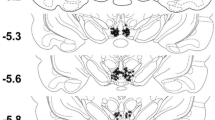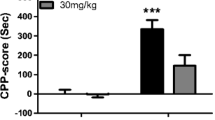Abstract.
Rationale: Numerous forms of evidence support a functional association between drug-seeking and ingestive behavior. One example is the augmentation of rewarding and cellular-activating effects of abused drugs by chronic food restriction. Within the past several years, a variety of orexigenic and anorexigenic neuropeptides that mediate adaptive responses to changes in energy balance and body weight have been identified. The involvement of these neuropeptidergic signaling systems in the modulation of drug reward has received little experimental attention. α-Melanocyte-stimulating hormone (α-MSH) and agouti-related protein, which act as agonist and antagonist, respectively, at melanocortin receptors (MCRs), are of particular interest because of their neuroanatomical distribution and opponent actions at a common receptor type. Objectives: The objective of this study was to determine whether lateral ventricular (i.c.v.) injections of the MCR agonist MTII and MCR antagonist SHU9119 at doses that decrease and increase food intake, respectively, modify the rewarding effect of amphetamine. Methods: The rewarding effect of amphetamine was measured in terms of its ability to lower the threshold for lateral hypothalamic self-stimulation (LHSS) using a rate–frequency method. The modulatory effects of MTII and SHU9119 were evaluated by preceding i.c.v. amphetamine injection with i.c.v. injection of one of these MCR ligands or vehicle. Tests were conducted in both ad-libitum-fed and food-restricted subjects. Results: SHU9119, the agouti-related protein-like antagonist, markedly increased overnight food intake of ad-libitum-fm-fed rats following i.c.v. injection of 1.0 µg and 0.5 µg. However, these injections had no effect on thresholds for LHSS tested 25 min or 60 min post-injection, nor did they alter the threshold-lowering effect of amphetamine (50 µg) tested 25 min, 100 min, or 24 h post-injection. MTII, the α-MSH-like agonist, suppressed overnight food intake of ad-libitum-fed rats following i.c.v. injection of 1.0 µg. MTII had no effect on thresholds for LHSS tested 60 min post-injection. However, this MCR agonist potentiated the threshold-lowering effect of amphetamine tested 100 min but not 24 h post-injection. This effect was evident in both ad-libitum-fed and food-restricted rats. Conclusions: These results indicate that agonist activity at MCRs potentiates amphetamine reward and that the anorexigenic neuropeptide α-MSH may exert this effect physiologically.
Similar content being viewed by others
Author information
Authors and Affiliations
Additional information
Electronic Publication
Rights and permissions
About this article
Cite this article
Cabeza de Vaca, S., Kim, GY. & Carr, K.D. The melanocortin receptor agonist MTII augments the rewarding effect of amphetamine in ad-libitum-fed and food-restricted rats. Psychopharmacology 161, 77–85 (2002). https://doi.org/10.1007/s00213-002-0998-1
Received:
Accepted:
Issue Date:
DOI: https://doi.org/10.1007/s00213-002-0998-1




